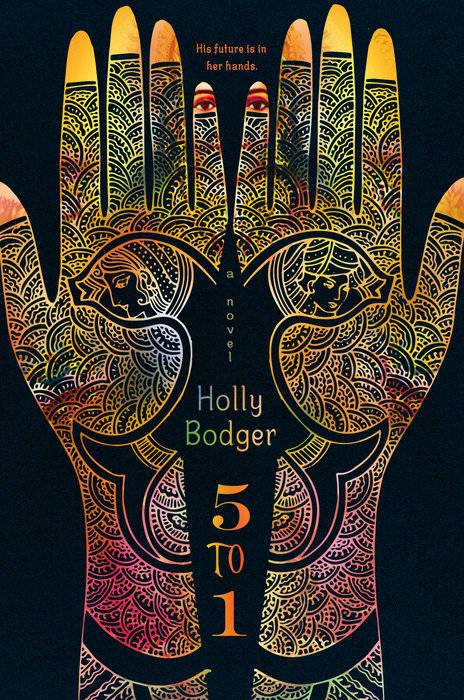5 to 1
Part Homeless Bird and part Matched, this is a dark look at the near future told through the alternating perspectives of two teens who dare to challenge the system.
In the year 2054, after decades of gender selection, India now has a ratio of five boys for every girl, making women an incredibly valuable commodity. Tired of marrying off their daughters to the highest bidder and determined to finally make marriage fair, the women who form the country of Koyanagar have instituted a series of tests so that every boy has the chance to win a wife.
Sudasa, though, doesn’t want to be a wife, and Kiran, a boy forced to compete in the test to become her husband, has other plans as well. As the tests advance, Sudasa and Kiran thwart each other at every turn until they slowly realize that they just might want the same thing.
This beautiful, unique novel is told from alternating points of view—Sudasa’s in verse and Kiran’s in prose—allowing readers to experience both characters’ pain and their brave struggle for hope.
An Excerpt from5 to 1
One month from today, I’ll wake to a team of makeup artists-- hairstylists-- buzzing outside my door.
At Nani’s command, they’ll swarm. They’ll poke me with their glittery swords, paint me with their honey.
I’ll fight the urge to scratch it away, because I’m Sudasa the Obedient and I must keep my fingers gluedtogether like the dolls Asha and I left buried under my bed.
When the artists flee, the designers will inch into place. They’ll spin me in their silks. garnish me with their golds.
They’ll lift me onto an easel. Wait for Nani to stamp me DONE!
After that, I’ll be placed upon an elephant-- the only creature who’ll appear more ridiculous than me.
She’ll deliver me to a temple with no god. Then Nani will send me down the aisle with strict instructions to keep my gaze off my beaded shoes.
The people of Koyanagar will Watch me. Question me. Love me? Hate me.
Hate me for not marrying their son. For not bearing his children daughters. For not guaranteeing his future.
At the end of the aisle, a boy-- squeezed into a black sherwani-- will sit on a chair, his spine as rigid as its spindles.
He won’t look at me; won’t dare.
I won’t look at him, either. Will look at the woman in front of him. The one with the stole of red. The color of love? No. The color of blood. Blood of birth. Blood of death. The only things that matter in Koyanagar.
When I stop in front of the woman-- Koyanagar’s only marriage officiant-- she’ll scan the papers in her hand. Commence the same speech she must utter for the two hundred girls who turn seventeen this year.
Her first words today-- they won’t be for Papa. He doesn’t have a say. Can’t give me away. How could he? You can only give away that which is yours to lose.
No. Instead, she’ll tell me to NNsitss then she’ll motion for the flowers to come.
Long garlands of lilies. Orange lilies. The flower of purity. (Or, some say, pride.)
She’ll ignite the fire of butter and wool. Tell the boy and me to stand. link our hands.
She’ll tell us to take seven steps. Accept seven blessings. Spend seven seconds circling around the fire.
When we’re done, she’ll present us to the audience. Me and my husband: the boy.
Only she won’t call him that. She’ll call him a name. A name I will not know. Until then, he’ll be a n#mber from the Koyanagar Registry. Not a boy named Ravi. Jamal. Shahid. Not a fiance. Or a friend.
A n#mber.
Today, before any of this can happen, I have to get out of bed. Have to put on my sari. Have to open my door. Have to accept Nani’s advice. Have to pretend Mummy gives some, too. Have to get in our carriage. Have to ride through the crowds. Have to sit in the theater. Have to wait for my turn. Have to follow the rules. Have to smile like I agree. Have to Have to Have to Have to Choose him.

